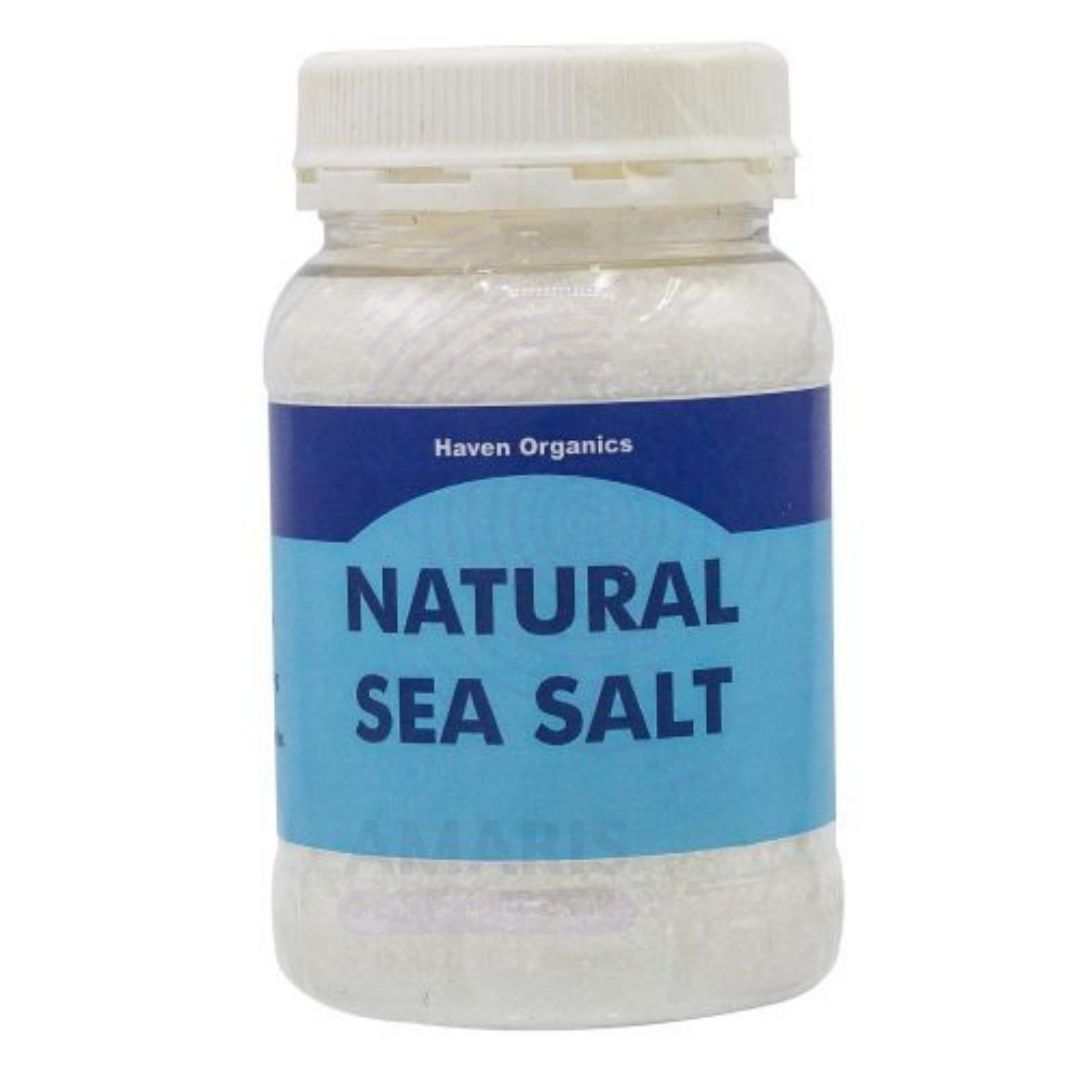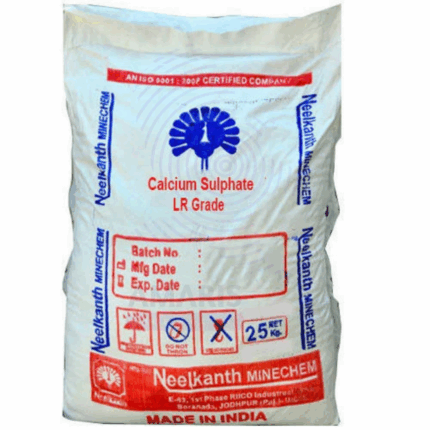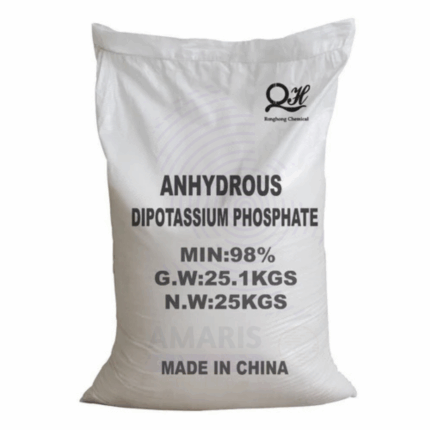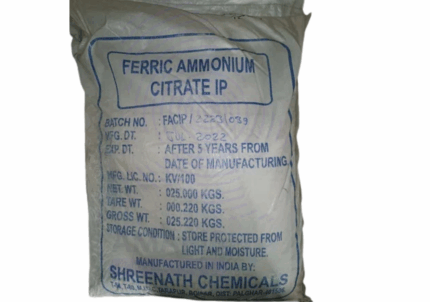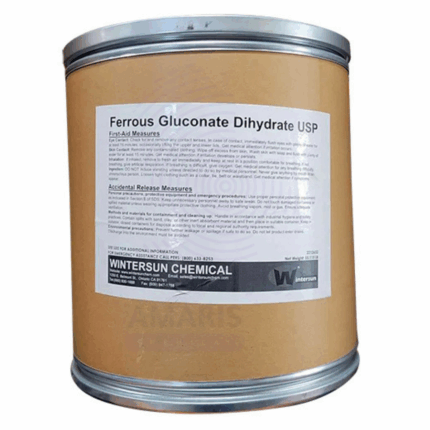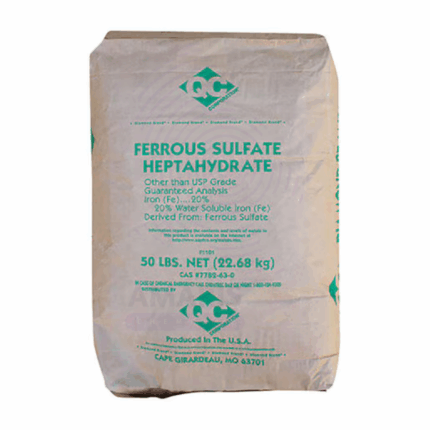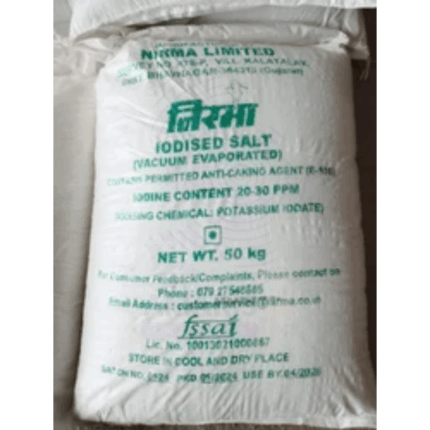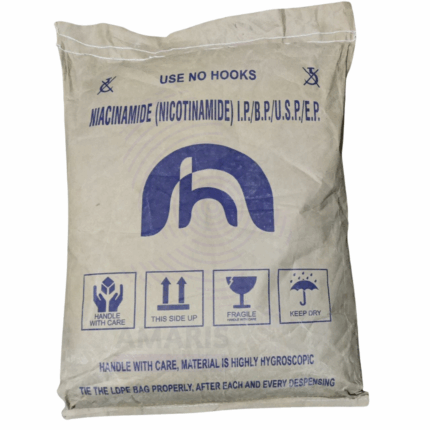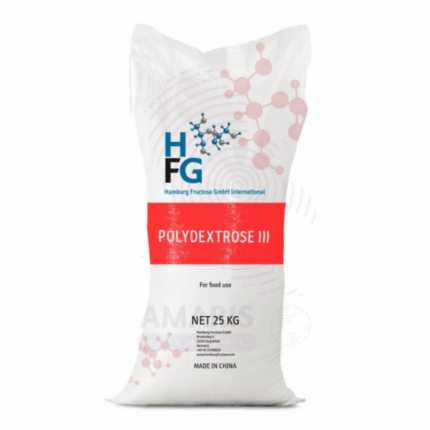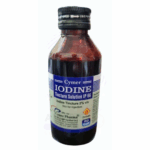
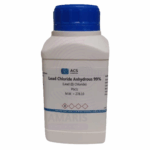
Iodised Salt Extra Pure
$ 18.05 Original price was: $ 18.05.$ 17.98Current price is: $ 17.98.
Iodised Salt Extra Pure is a refined form of sodium chloride enriched with a precise amount of iodine, typically in the form of potassium iodate or iodide. It is primarily used to prevent iodine deficiency disorders, making it essential in nutritional and public health applications. Beyond its dietary use, iodised salt also serves in laboratory settings for controlled experiments involving iodine content and salt solubility studies. Its high purity ensures minimal contamination, making it suitable for analytical and pharmaceutical applications where quality and consistency are critical. Proper storage in airtight containers is recommended to prevent iodine loss due to air exposure.
Iodised Salt Extra Pure
Primary Uses
- Iodine Supplementation Studies:
Used in nutrition and biochemistry labs to analyze the impact of iodine fortification in dietary salt, especially for studying thyroid function and iodine deficiency disorders. - Analytical Chemistry (Iodine Detection):
Serves as a model sample for validating iodometric and colorimetric assays that detect iodine or iodide content in fortified food products. - Educational Demonstrations:
Common in school or undergraduate experiments to demonstrate trace element fortification, nutrient absorption, and simple extraction of iodine.
Secondary Uses
- Quality Control Testing:
Used in laboratories involved in food safety and standards testing to monitor iodine concentration, salt purity, and compliance with fortification guidelines. - Research on Iodine Stability:
Studied in relation to the effect of storage, heat, and humidity on the stability of iodised compounds over time. - Microbiological Media Preparation (Non-standard):
Occasionally used where salt is a required component and iodised variants are under evaluation for microbial impact, although plain sodium chloride is more typical.
| PACK SIZE |
250 grams Plastic Tin |
|---|
1. Basic Identification Attributes
- Product Name: Iodised Salt
- Chemical Name: Sodium Chloride with Potassium Iodate or Potassium Iodide
- Grade: Extra Pure (suitable for laboratory or controlled applications)
- Formula: NaCl + KIO₃ (or KI)
- Appearance: White crystalline or powdery solid
- Odor: Odorless
2. Composition
- Sodium Chloride (NaCl): ~98–99%
- Potassium Iodate (KIO₃) or Potassium Iodide (KI): 15–50 ppm (as iodine content)
- Moisture content: Typically <0.5%
- Additives (if any): Anticaking agents like calcium silicate (optional)
3. Physical & Chemical Properties
- Solubility: Soluble in water
- Melting Point: ~801 °C (NaCl)
- Boiling Point: >1400 °C
- pH (5% solution): ~6.5–7.5
- Stability: Stable under normal conditions
4. Safety & Hazard Attributes
- GHS Classification:
✅ Not classified as hazardous under normal laboratory handling - PPE Requirements:
- Gloves (nitrile or latex)
- Safety goggles
- Lab coat
- First Aid Measures:
- Inhalation: Move to fresh air
- Skin/Eye Contact: Rinse with water
- Ingestion: Rinse mouth, not harmful in small amounts
- Environmental Impact: Minimal at lab scale; dispose in accordance with local regulations if iodate/iodide levels are high
5. Storage & Handling Attributes
- Storage Conditions:
- Store in tightly sealed container
- Keep in a cool, dry place
- Protect from moisture and light to prevent iodine degradation
- Incompatible Materials: Strong acids (may release iodine), silver nitrate (reacts with chloride)
6. Laboratory Applications
- Primary Uses:
- Nutritional and food chemistry studies (iodine enrichment)
- Control experiments in iodine deficiency testing
- Reference for salt analysis in titration (e.g., Mohr’s method)
- Demonstrating iodine stability and loss under different conditions
- Secondary Uses:
- Preparing iodine spot test solutions
- Teaching redox chemistry with iodised vs. non-iodised salt
- Demonstrating sublimation of iodine from iodised salt
- Biological studies related to thyroid function
SAFETY PRECAUTIONS
Personal Protective Equipment (PPE):
- Wear a lab coat, gloves, and safety goggles.
- Use a dust mask if working with large quantities in powder form.
Handling:
- Avoid generating dust.
- Prevent contact with eyes.
- Wash hands thoroughly after handling.
- Use in a well-ventilated area.
Storage:
- Store in a cool, dry place.
- Keep the container tightly sealed to prevent moisture absorption.
- Protect from direct sunlight and incompatible materials such as strong acids.
FIRST AID MEASURES
Inhalation:
- Move to fresh air.
- Seek medical attention if coughing or irritation develops.
Skin Contact:
- Wash with soap and water.
- Seek medical advice if irritation occurs.
Eye Contact:
- Rinse cautiously with water for several minutes.
- Remove contact lenses if present and easy to do.
- Continue rinsing and seek medical attention if irritation persists.
Ingestion:
- Rinse mouth with water.
- Iodised salt is generally safe in small amounts; seek medical advice if large quantities are consumed or if symptoms develop.
FIRE FIGHTING MEASURES
Flammability:
- Non-flammable.
Extinguishing Media:
- Use any media appropriate for surrounding fire (water spray, foam, CO₂, dry chemical).
Hazardous Combustion Products:
- May release iodine vapors or sodium oxides if subjected to high temperatures.
Firefighter Protection:
- Use standard protective equipment and SCBA if necessary.
- Avoid inhalation of fumes.


 Preservatives(food)
Preservatives(food) Flavor Enhancers
Flavor Enhancers Acidulants
Acidulants Sweeteners
Sweeteners Antioxidants
Antioxidants Colorants(food)
Colorants(food) Nutraceutical Ingredients (food)
Nutraceutical Ingredients (food) Nutrient Supplements
Nutrient Supplements Emulsifiers
Emulsifiers
 Collectors
Collectors Dust Suppressants
Dust Suppressants Explosives and Blasting Agents
Explosives and Blasting Agents Flocculants and Coagulants
Flocculants and Coagulants Frothers
Frothers Leaching Agents
Leaching Agents pH Modifiers
pH Modifiers Precious Metal Extraction Agents
Precious Metal Extraction Agents
 Antioxidants(plastic)
Antioxidants(plastic) Colorants (Pigments, Dyes)
Colorants (Pigments, Dyes) Fillers and Reinforcements
Fillers and Reinforcements Flame Retardants
Flame Retardants Monomers
Monomers Plasticizers
Plasticizers Polymerization Initiators
Polymerization Initiators Stabilizers (UV, Heat)
Stabilizers (UV, Heat)
 Antifoaming Agents
Antifoaming Agents Chelating Agents
Chelating Agents Coagulants and Flocculants
Coagulants and Flocculants Corrosion Inhibitors
Corrosion Inhibitors Disinfectants and Biocides
Disinfectants and Biocides Oxidizing Agents
Oxidizing Agents pH Adjusters
pH Adjusters Scale Inhibitors( water)
Scale Inhibitors( water)
 Antioxidants(cosmetic)
Antioxidants(cosmetic) Emollients
Emollients Fragrances and Essential Oils
Fragrances and Essential Oils Humectants
Humectants Preservatives
Preservatives Surfactants(cosmetic)
Surfactants(cosmetic) Thickeners
Thickeners UV Filters
UV Filters
 Fertilizers
Fertilizers Soil Conditioners
Soil Conditioners Plant Growth Regulators
Plant Growth Regulators Animal Feed Additives
Animal Feed Additives Biostimulants
Biostimulants Pesticides (Herbicides, Insecticides, Fungicides)
Pesticides (Herbicides, Insecticides, Fungicides)
 Active Pharmaceutical Ingredients (APIs)
Active Pharmaceutical Ingredients (APIs) Excipients
Excipients Solvents(pharmaceutical)
Solvents(pharmaceutical) Antibiotics
Antibiotics Antiseptics and Disinfectants
Antiseptics and Disinfectants Vaccine Adjuvants
Vaccine Adjuvants Nutraceutical Ingredients (pharmaceutical)
Nutraceutical Ingredients (pharmaceutical) Analgesics & Antipyretics
Analgesics & Antipyretics
 Analytical Reagents
Analytical Reagents Solvents(lab)
Solvents(lab) Chromatography Chemicals
Chromatography Chemicals Spectroscopy Reagents
Spectroscopy Reagents microbiology-and-cell-culture-reagents
microbiology-and-cell-culture-reagents Molecular Biology Reagents
Molecular Biology Reagents Biochemical Reagents
Biochemical Reagents Inorganic and Organic Standards
Inorganic and Organic Standards Laboratory Safety Chemicals
Laboratory Safety Chemicals Specialty Laboratory Chemicals(Special Laboratory Equipment)
Specialty Laboratory Chemicals(Special Laboratory Equipment)
 Demulsifiers
Demulsifiers Hydraulic Fracturing Fluids
Hydraulic Fracturing Fluids Scale Inhibitors(oil)
Scale Inhibitors(oil) Surfactants(oil)
Surfactants(oil) Drilling Fluids
Drilling Fluids
 Dyes and Pigments
Dyes and Pigments Bleaching Agents
Bleaching Agents Softening Agents
Softening Agents Finishing Agents
Finishing Agents Antistatic Agents
Antistatic Agents
 Admixtures
Admixtures Waterproofing Agents
Waterproofing Agents Sealants and Adhesives
Sealants and Adhesives Curing Compounds
Curing Compounds Concrete Repair Chemicals
Concrete Repair Chemicals Anti-Corrosion Coatings
Anti-Corrosion Coatings
 Surfactants(cleaning)
Surfactants(cleaning) Builders
Builders Enzymes
Enzymes Solvents (Cleaning)
Solvents (Cleaning) Fragrances
Fragrances
 Electronic Chemicals
Electronic Chemicals Catalysts
Catalysts Lubricants
Lubricants Photographic Chemicals
Photographic Chemicals Refrigerants
Refrigerants Automotive chemicals
Automotive chemicals Pyrotechnic Chemicals
Pyrotechnic Chemicals
 Biodegradable Surfactants
Biodegradable Surfactants Bio-based Solvents
Bio-based Solvents Renewable Polymers
Renewable Polymers Carbon Capture Chemicals
Carbon Capture Chemicals Wastewater Treatment Chemicals
Wastewater Treatment Chemicals
 Pigments
Pigments Solvents(paint)
Solvents(paint) Specialty Coatings
Specialty Coatings Binders/Resins
Binders/Resins Additives
Additives Driers
Driers Anti-Corrosion Agents
Anti-Corrosion Agents Functional Coatings
Functional Coatings Application-Specific Coatings
Application-Specific Coatings
 Fresh Herbs
Fresh Herbs Ground Spices
Ground Spices Whole Spices
Whole Spices Spice Blends
Spice Blends Dried Herbs
Dried Herbs
 Leavening Agents
Leavening Agents Dough Conditioners
Dough Conditioners Flour Treatments
Flour Treatments Fat Replacers
Fat Replacers Decoratives
Decoratives Preservatives(baking)
Preservatives(baking)
 Plasticizers & Softeners
Plasticizers & Softeners Reinforcing Agents
Reinforcing Agents Adhesion Promoters
Adhesion Promoters Vulcanizing Agents
Vulcanizing Agents Antidegradants
Antidegradants Blowing Agents
Blowing Agents Fillers & Extenders
Fillers & Extenders Accelerators & Retarders
Accelerators & Retarders